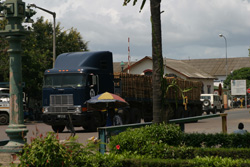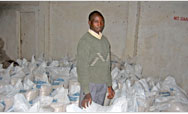You are here » Home » Telling Our Story
Success Story
Officials and businesses discuss border delays together for the first time
Goods Clear Customs Faster

| |
Photo: USAID/Lisa Yarmoshuk
|
|
Customs officials at the Mozambique-South Africa Ressano Garcia border now process trucks like this one in two to five days.
USAID has helped Mozambique’s customs officials reduce the time for processing goods from as many as 30 days to an average of two to five days. This has reduced the cost of transporting goods into and from Mozambique. While USAID continues to assist customs authorities as they strive for greater efficiency, Mozambique is already enjoying the results of more competitive customs procedures.
|
The customs center at the Mozambique-South Africa border in Ressano Garcia was packed. One consignment of goods had been sitting there for 30 days, waiting for clearance and release. A place like this was fertile ground for corruption or for diverting goods illegally. Moreover, this situation brought considerable profit losses, ran up shipping and production costs, and forced producers to set high prices for goods in both domestic and international markets. In this environment, it was hard to stay competitive. To further complicate matters, customs authorities and the private sector disagreed about the causes and extent of the problem. This lead to more tension.
The Mozambique Customs Administration was eager to improve its image and overhaul its bureaucracy. It turned to USAID for help, knowing that one of the agency’s projects strives to bring more competitiveness to trade in Southern Africa. They asked USAID’s trade hub to help them speed up the clearance of merchandise through customs entry and exit points and resolve tensions with the private sector. USAID brought customs officials and private sector representatives together in a meeting. It was the first time that all interested parties — including freight forwarders, transporters and business associations — came together to discuss the issues, identify the problems, and find solutions.
An analysis of the situation determined that delays were mainly due to cumbersome customs procedures and red tape, an obsolete computer system, and lack of common regional procedures. USAID suggested several measures that would bring significant improvements quickly, including decentralizing some functions to regional offices, improving communications within customs, and the aligning procedures with the World Customs Organization Kyoto Convention. In addition, customs and private sector representatives formed a working group to oversee a more detailed analysis, known as a time release study, that assesses the time elapsed at each stop in the cargo release process. The goal is to identify problem areas, remove bottlenecks and improve the procedures. Finally, thanks to the initial improvements that customs authorities made, customs authorities are now processing goods in just two to five days.
Print-friendly version of this page (467kb - PDF)
Click here for high-res photo
Back to Top ^ | 

